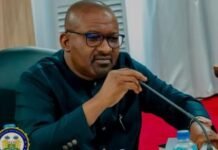By Oswald Hanciles
The educational systems in Sierra Leone have been monumental failures. It is obvious. The festering poverty of Sierra Leoneans sitting on top of some of the wealthiest marketable natural resources in the world is a gnawing pointer to the poor education we have imbibed in Sierra Leone.
Those who think that the quality of education is not the main culprit for Sierra Leone’s daunting poverty don’t know the essence of education. Education is all about transferring knowledge to an individual, and/or a society, for optimal survival of the individual or/and society.
Sierra Leone has some of the worst human survival indicators in the world – this is a disgrace, given the disproportionate natural wealth Sierra Leone is endowed with.
Man is a leadership species and a sociological species. Man can best survive with dynamic leaders within orderly and productive societies. In Sierra Leone, our educational systems have meant generally breeding a poor leadership at nearly all tiers of our society. We have predatory leadership that have a sense of entitlement in preying (‘ for tiff big money nar gofment’!) on the rest of society.
We have a leadership that does not see it as their responsibility to guide people in society to improve their livelihoods – a childishly egoistic leadership; and reeking with demonic egotism. We have trained our leadership in educational systems where they think that education is essentially about imbibing information and vomiting them on paper during examinations to earn credentials; Bachelor’s, Master’s, and doctorate degrees being perceived as the most superior – what I have often disdained as the “classroom mentality”.
And the leadership thinks it is their divine right to steal the most from the impoverished majority – once in senior government positions – the more academic credentials they have. Generally, our academic content are devoid of SURVIVAL-CONTENT.
Seriously, I challenge you to randomly ask pupils in primary and secondary schools; students in our universities and colleges… these questions: What does WATER intake do to the human body; and what does inadequate water do to the human body? 98% of them are not likely to answer that question correctly.
Ask them: What is the quantity of water that is adequate for the human body in our hot and humid climate in Sierra Leone? 99% of them won’t answer that question correctly.
Ask them: what should be the daily intake for the human body of minerals and vitamins, and what are the natural sources within Sierra Leone of these minerals and vitamins? 99.9% of them won’t answer.
Ask them: what are the mineral and vitamin content in fruits and vegetables like mango, orange, tomato, potato leaves, pawpaw, pear, etc. and what happens to the human body when it takes adequate amounts of them; or, does not take them? You could well be speaking Chinese to them. When I was at State House as media adviser to former President Ernest Bai Koroma (January, 2012 and March, 2018), I tried to draw attention to issues on nutrition, and the need for Nutrition Education. That took me to nutrition desks in the ministries of agriculture, and health, and to a special US-government-sponsored unit in the Office of the Vice President, called Scaling Up Nutrition (SUN). They all moaned about one basic problem: inadequate resources to do their jobs.
Around schools and colleges – even the most expensive and elitist schools – the hawkers would almost be NEVER seen selling fruits and vegetables; but their stalls would be over spilling with imported biscuits, chocolates, sweets, and sugary soft drinks. Why? Simple demand and supply laws. The pupils and students do not create a demand for fruits and vegetables. Our children lack knowledge that their body needs adequate daily intake of vitamins and minerals.
Among wider Sierra Leonean society, there is no demand for fruits and vegetables either. Most of the fruits and vegetables being sold in the capital city of Sierra Leone, Freetown, the biggest consumer market in the country, are by female petty traders who hug the front doors of supermarkets – targeting the elite.
What sort of education we have in Sierra Leone when pupils and students are not being taught two of the most fundamental needs for survival, adequate water and adequate fruits and vegetables, until such information is inculcated into them?
The smallness of information being given our pupils and students as “education” is alarmingly disgraceful. In the 1960s/early 1970s when I was a pupil in the Albert Academy in Freetown, we would have FIVE different books for Geography; THREE different books for Mathematics…; about 35 text books which even those from poor homes could afford to buy.
Today, too many pupils in our public secondary schools go to school with NO TEXTBOOKS. This continues right up to tertiary institutions. And there, their libraries are largely empty; and the few books in libraries would be cannibalized.
Are we producing graduates in Sierra Leone who can compete with their academic peers in even Kenya or Ghana? No!
I have had complaints from several employers in the engineering and mineral mining sectors over the past fifteen years that most engineering graduates from our universities have to go through complete retraining to be fit to be put on the job in their companies. Please, don’t forget my avowed contempt for “classroom education”.
There is URGENT need for mass education through mass communications out of the classroom. The Chinese government can give us lessons in this – how they were able to use mass education to hoist over half of their over a billion people from the abyss of poverty in just a few decades.
Until about 10 years ago, the German government was financing a literacy campaign for illiterates in Sierra Leone.
Apparently, that just fizzled out – even as our illiteracy levels have remained stagnant at 80% of our population; our educated populace with primary and secondary school qualifications are pathetically shallowly-educated; and even those educated to tertiary levels are generally mal-educated, and not competitive even in the terrain of West Africa.
I am unimpressed by the Bio Administration’s emphasis on “education” if it means perpetuation of those educational systems that have scandalously failed. We need Environmental Education. We need Nutrition Education.
We need Anti-Corruption Education (There must be imaginative modes of Anti-Corruption Education at all levels in our society). We need Physical Education. We need Military Preparedness Education. We need massive Education in Science and Technology. We need Education to be United as a People!
If our experts in our governmental systems would not be largely mediocre professionals, classroom-mentality bureaucrats, they would have long since made contact with me to ask questions on my ideas, and to guage my passion, and support my energy for this subject. Alas, they wouldn’t!!
Classroom- Mentality types are very unlikely to tap the minds of the knowledgeable citizenry if they are not in classrooms. Can the populace hear me? Can ‘revolutionaries’ hear me?
We need mass education of the populace – especially children and youth to disempower, and negate the influence of, those mal-educated Sierra Leonean leaders who every second today on social media are screaming “APC… SLPP… NGC…” – when the vast majority of our populace lack basic survival knowledge.
Our Sierra Leonean compatriots in the United States and Europe who are inundating us with audio and video messages every minute – they have far faster and cheaper internet to ours – can unite to catalyze faster and cheaper internet for children and youth in Sierra Leone; and support mass Survival-Education through the internet.
They can also team up with the Anti-Corruption Commission (ACC) for close monitoring and evaluation on what the Government of Sierra Leone is going to do with the $50 million that has been gotten from the World Bank – taking advantage of the Access to Information LAW of Sierra Leone to DEMAND information from government.




